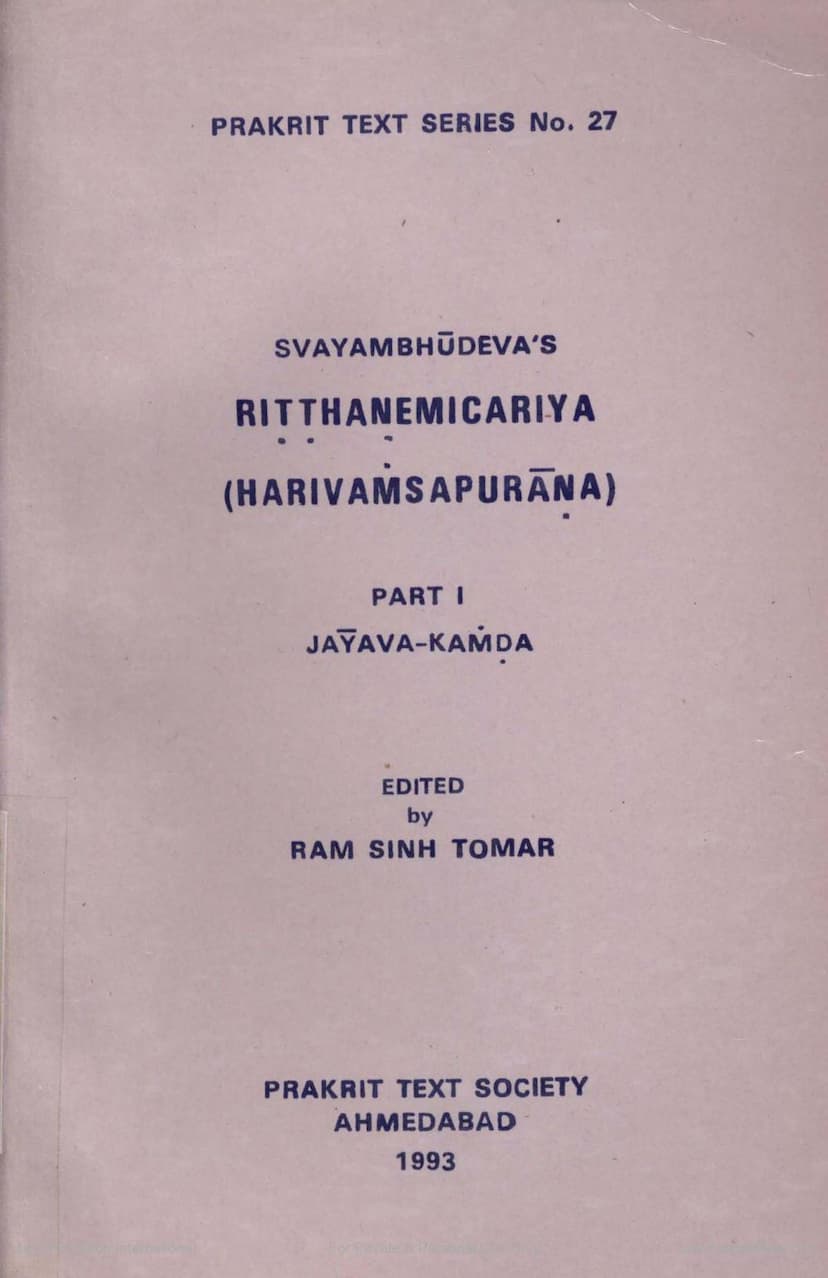Ritthnemichariyam Part 1
Added to library: September 2, 2025

Summary
Here's a comprehensive summary of "Ritthanemichariyam Part 1 (Jayava-kanda)" based on the provided text:
Overview of the Work:
"Ritthanemichariyam" (also known as "Harivamsapurana") is an epic poem composed by Svayambhudeva in Apabhramsa. This particular volume, Part 1, covers the "Jayava-kanda" (Yadava-kanda), focusing on the lineage and early life of Krishna and Balarama within the Jain tradition. The work is edited by Ramsinh Tomar and published by the Prakrit Text Society, Ahmedabad, in 1993.
Purpose and Context:
The book is presented as part of the Prakrit Text Series, with a foreword by general editors Dalsukh Malvania and H.C. Bhayani. They explain their intention to publish the entire text of "Ritthanemichariyam" before releasing an introduction and Hindi translation. The editors highlight the importance of the "Jayava-kanda" for students of Apabhramsa literature, particularly its contribution to the "Krishna-katha" (Krishna narrative) in that corpus.
Key Themes and Content:
The primary focus of this volume is the Yadava lineage and the early life of Krishna and Balarama, framed within the Jain cosmological and ethical framework.
Key sections and their content (as indicated by the "Vishayanukram" - Table of Contents):
- Chapter 1: Siriparamaganalu (Praise of the Supreme Being/First Tirthankara): This chapter likely begins with invocations and praises, establishing the spiritual foundation of the epic.
- Chapter 2: Jayavakuru-kahuppalu (Narrative of the Yadu Dynasty): This section delves into the ancestry and origins of the Yadu dynasty, tracing their lineage and establishing the context for Krishna's birth.
- Chapter 3: Samudravijaya-bhiseka (Coronation/Ascension of Samudravijaya): This likely details the rise to prominence and rule of Samudravijaya, Krishna's grandfather.
- Chapter 4: Gandharvasena-lambho (Encounter with Gandharvasena): This chapter might describe an interaction or conflict involving Gandharvasena, a significant figure in the narrative.
- Chapter 5: Rohini-svayamvara (Rohini's Swyamvara/Choice of Husband): This chapter focuses on the marriage of Vasudeva (Krishna's father) to Rohini, detailing the event and the circumstances surrounding it.
- Chapter 6: Hari-kula-vansotpatti (Origin of the Hari Dynasty): This section likely further elaborates on the lineage and establishment of the Hari lineage, closely tied to the Yadavas.
- Chapter 7: Govinda-bala-kola (Krishna's Childhood Frolics): This is a significant portion dedicated to the childhood exploits and playful activities of Krishna, showcasing his extraordinary nature.
- Chapter 8: Nemi-jammabhiseko (Krishna's Installation/Ascension): This chapter might refer to Krishna's installation in a significant role, potentially as a Vasudeva.
- Chapter 9: Ruppini-aparana (Kidnapping/Abduction of Ruppini): This likely refers to the abduction of Rukmini, a crucial event in Krishna's life.
- Chapter 10: Pajyunna-harana (Abduction of Pradyumna): This chapter focuses on the abduction of Pradyumna, Krishna's son.
- Chapter 11: Pajyunna-lila (Pradyumna's Playful Deeds): This section would detail the playful activities and exploits of Pradyumna.
- Chapter 12: Pajyunna-milana (Pradyumna's Reunion): This chapter likely describes Pradyumna's reunion with his family or loved ones.
- Chapter 13: Pajyunna-vivaho (Pradyumna's Marriage): This section would focus on the marriage of Pradyumna.
Jain Interpretation of Krishna:
The introductory section, "Apabhramsa Sahitya mein Krishnakavya" (Krishna Poetry in Apabhramsa Literature), provides crucial context regarding the Jain perspective on Krishna. It clarifies that in Jainism, Krishna is not considered a divine avatar or an incarnation of God, but rather a powerful and exceptional human being, a "Shalaka Purusha" (distinguished personality) and a "Vasudeva" (a hero who defeats his antagonist Vasudeva). The narrative follows the Jain tradition's adaptation of Vedic stories, emphasizing moral and ethical aspects.
Literary Style and Significance:
The text is written in Apabhramsa, a later stage of Prakrit. Svayambhudeva, a prominent Apabhramsa poet, is known for his mastery of this language and his ability to weave complex narratives. The "Jayava-kanda" highlights his skill in descriptive passages, depiction of emotions, and vivid portrayal of events, particularly Krishna's childhood. The editors note the influence of Sanskrit and Prakrit literature on Apabhramsa poetry, including the Krishna narrative.
Key figures and events mentioned in the early chapters:
- Yadu Dynasty: The narrative traces the lineage from King Yadu, through Narapati, Shura, and Subira, leading to figures like Samudravijaya and Vasudeva.
- Vasudeva: Krishna's father, described as exceptionally beautiful and possessing great strength. His early life involves leaving his home and eventually marrying Rohini.
- Rohini: The princess Vasudeva marries, and mother of Balarama.
- Ugrasena: Vasudeva's uncle, who rules Mathura.
- Kamsa: Ugrasena's son and Vasudeva's cousin, who usurps the throne and becomes the antagonist. His story is intertwined with Vasudeva and Devaki.
- Devaki: Vasudeva's wife and Krishna's mother. The narrative touches upon the prophecy surrounding Krishna's birth and his subsequent protection.
- Balarama: Krishna's elder brother, a powerful figure who assists Krishna.
Overall Impression:
"Ritthanemichariyam Part 1 (Jayava-kanda)" is a significant literary work that offers a Jain perspective on the popular Krishna narrative. It is a testament to the rich tradition of Apabhramsa poetry and its contribution to religious and epic literature. The text, as presented by the editors, aims to make this important work accessible to scholars and enthusiasts of ancient Indian literature.